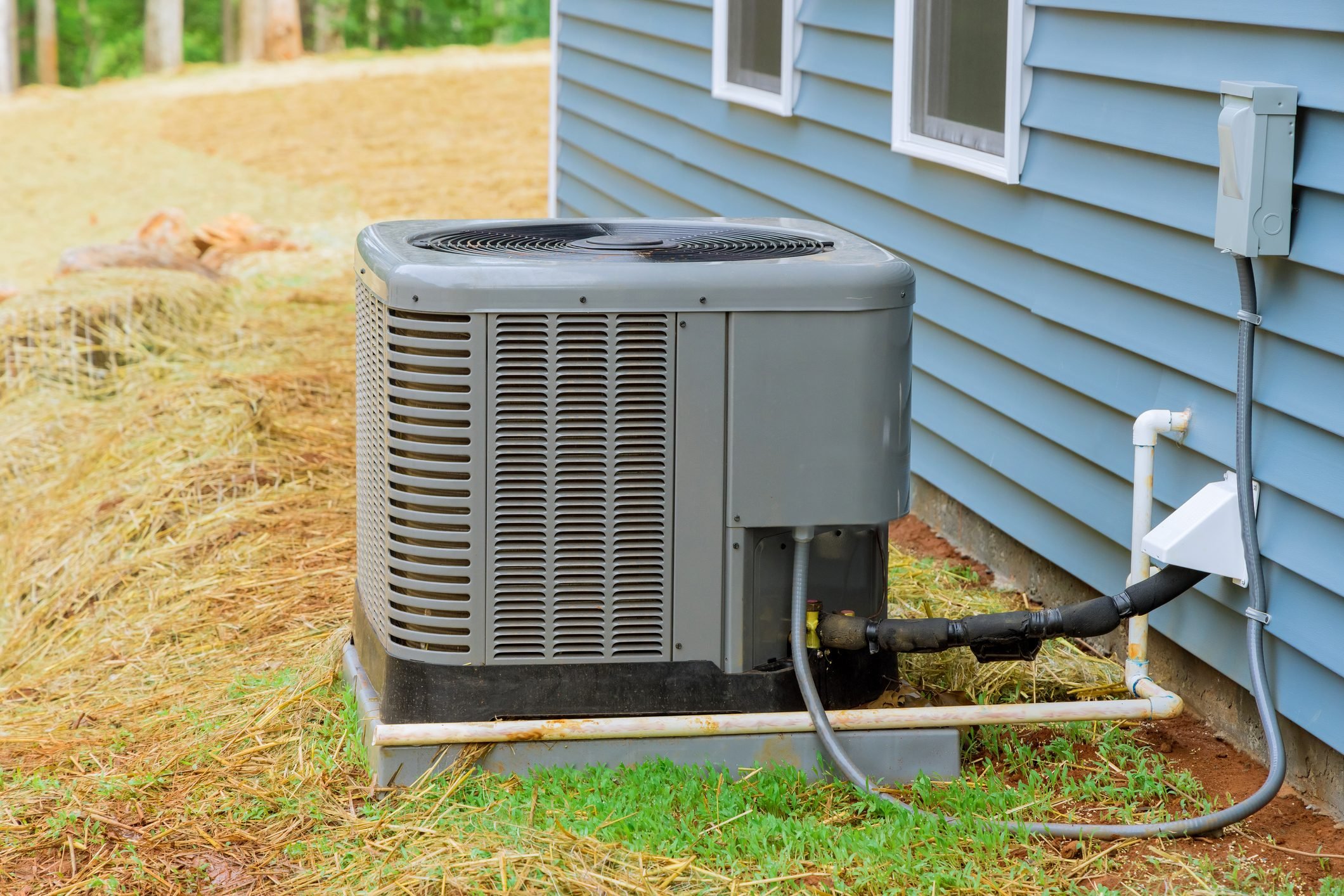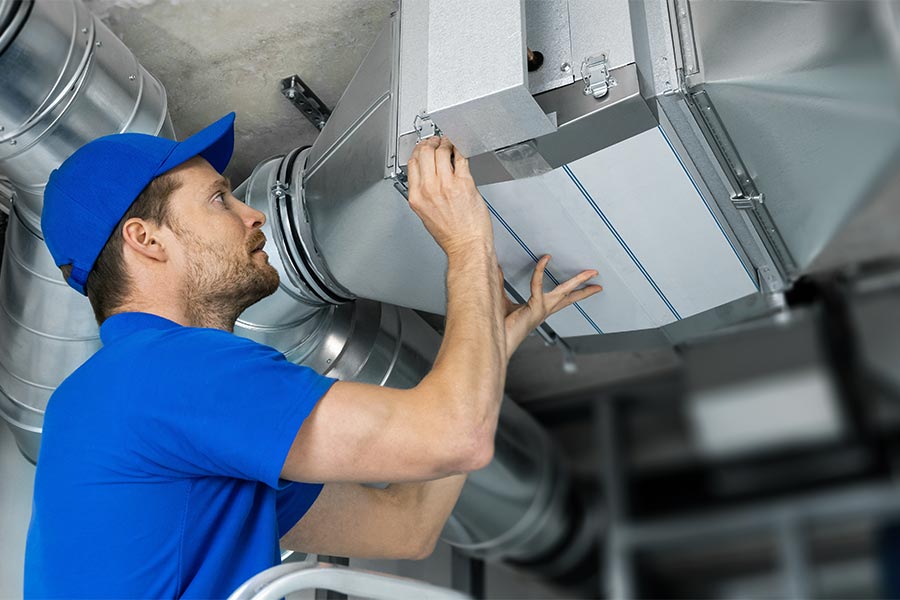How a Reputable HVAC System Enhances Indoor Air Quality and Convenience
A trustworthy heating and cooling system is crucial for keeping indoor air high quality and comfort. It controls temperature level and humidity, producing a much healthier living environment. Reliable air purification removes pollutants and allergens, while proper humidity degrees prevent mold growth. Normal upkeep warranties peak efficiency, improving system performance. Understanding these components discloses just how they connect to create a fresh ambience. The connection in between HVAC systems and general well-being goes much deeper than one may expect.
Understanding the Fundamentals of HVAC Solutions
HVAC systems, fundamental for contemporary convenience, encompass home heating, air, and air flow conditioning elements that collaborate to manage indoor environments. These systems are designed to keep optimal temperature levels, ensuring that rooms stay comfy despite external weather. Heating components, such as heaters or heat pumps, provide warmth during chillier months, while air conditioning devices cool rooms when temperature levels rise.
Ventilation plays an essential duty, facilitating the circulation of fresh air and getting rid of stagnant air, which aids in preserving a balanced environment. Different types of HVAC systems exist, including centralized and decentralized arrangements, each matched for different building dimensions and purposes. Furthermore, modern-day advancements have actually presented wise innovations, enabling improved control over interior climate. Recognizing these basics enables individuals to value just how HVAC systems add to overall well-being and comfort in industrial and domestic areas alike, laying the foundation for conversations on their effect on interior air quality.
The Duty of Air Filtration in Indoor Air Quality
A significant facet of preserving interior air high quality works air filtration, which plays a crucial function in getting rid of contaminants and allergens from the atmosphere. Cooling and heating systems geared up with top quality filters can record a variety of impurities, consisting of dirt, pollen, family pet dander, and mold spores. This filtering procedure substantially minimizes the concentration of air-borne fragments, leading to a cleaner and healthier interior ambience.
Additionally, regular upkeep of air filters is vital to guarantee peak performance. Clogged or dirty filters can prevent air movement, reducing the system's effectiveness and possibly enabling pollutants to circulate within the room. By replacing or cleaning up filters as suggested, property owners can boost their a/c system's ability to provide fresh air.
Humidity Control and Its Effect on Comfort
While numerous might focus on temperature regulation, humidity control is similarly crucial for maintaining comfort in indoor environments. High humidity levels can bring about pain, making areas really feel warmer than they actually are, while reduced humidity can trigger dry skin, inflammation, and enhanced susceptibility to breathing concerns. A reputable HVAC system plays a substantial duty in taking care of interior moisture, guaranteeing that air is neither also completely dry nor also damp.
Optimal moisture degrees usually vary from 30% to 50%, advertising a comfy ambience. When humidity is well-regulated, passengers experience boosted thermal comfort, improved indoor air high quality, and decreased dangers of mold development and dirt mite proliferation. Appropriate moisture control can shield furniture and structural aspects from damage created by extreme dampness or dry skin. As a result, integrating effective moisture monitoring into heating and cooling systems is vital for promoting a positive and healthy and balanced indoor environment helpful to well-being and performance.
The Significance of Normal Maintenance
Normal maintenance of heating and cooling systems is necessary for guaranteeing peak performance and durability. This aggressive strategy not only reduces prospective break downs yet likewise boosts power efficiency, which can cause considerable price financial savings with time. Set up assessments enable technicians to identify and attend to issues before they escalate into pricey repair services, ensuring the system operates efficiently.
In addition, routine maintenance entails cleaning or replacing filters, examining refrigerant degrees, and examining air ducts, all of which add to suitable air flow and system effectiveness. By preserving the heating and cooling system, home owners can also stop excessive wear and tear on components, expanding the general lifespan of the system.
A well-maintained A/c system operates silently and safely, reducing the threat of unsafe circumstances. Finally, routine upkeep is a crucial investment in both the performance of cooling and heating systems and the comfort of indoor environments, eventually promoting a much healthier home.
How Cooling And Heating Equipment Reduce Allergens and Pollutants
Effective a/c systems play an important duty in reducing allergens and toxins within interior settings, thus boosting overall air top quality. These systems utilize sophisticated filtration innovations that catch dirt, pollen, mold and mildew check that spores, and family pet dander, preventing them from circulating throughout the home. High-efficiency particulate air (HEPA) filters are specifically efficient, trapping as much as 99.97% of particles as small as 0.3 microns.

Power Effectiveness and Its Benefits for Health
Energy-efficient HVAC systems not only lower power consumption however additionally have significant health and wellness advantages for passengers. By maximizing energy usage, these systems can maintain consistent indoor temperatures, which helps protect against the growth of mold and mold. Managing moisture degrees is important for respiratory health, as excess dampness can intensify allergies and asthma. Furthermore, energy-efficient systems commonly integrate sophisticated purification innovations that boost air quality by eliminating airborne bits and toxins, additionally improving overall wellness.
Reduced energy intake indicates decreased discharges from power plants, contributing to cleaner outside air top quality, which indirectly supports the health of homeowners. With a concentrate on sustainability, energy-efficient a/c systems promote a healthier living environment. By purchasing such systems, property owners not only reduce energy costs yet additionally make a considerable dedication to the health of their communities and households. Ultimately, power efficiency in cooling and heating systems cultivates a much healthier interior atmosphere for all.
Enhancing Comfort With Smart Modern Technology Assimilation
As clever innovation continues to advance, its combination right into heating and cooling systems substantially enhances interior comfort. Smart thermostats, as go to my site an example, allow customers to personalize home heating and cooling schedules based upon their daily regimens, guaranteeing suitable temperatures when people are home. These devices can discover choices with time, adjusting settings instantly for maximum comfort.
Clever sensing units keep track of indoor air quality and humidity degrees, giving real-time feedback that aids keep a healthy and balanced atmosphere. By communicating with a/c systems, these sensors can trigger modifications to air flow and temperature level, guaranteeing consistent comfort.
Mobile applications further encourage users, allowing remote of HVAC settings from anywhere, thus providing benefit and versatility.
Regularly Asked Inquiries

Just How Can I Tell if My HVAC System Is Efficient?
To determine a/c performance, one can inspect power bills for anomalies, evaluate for uncommon noises, monitor temperature level consistency, guarantee appropriate air flow, and timetable normal maintenance. These elements collectively indicate the system's operational efficiency and performance.
What Indicators Suggest Poor Indoor Air Quality?
Indicators of poor indoor air top quality include persistent smells, extreme dirt buildup, boosted allergic reaction symptoms, visible mold growth, and varying moisture degrees. These indications commonly recommend that air flow or air purification systems may be poor or defective.
Can a Cooling And Heating System Aid With Pet Dog Dander?

How Usually Should I Replace My Air Filters?
Air filters need to basics generally be replaced every 1 to 3 months, depending upon use and indoor air quality. HVAC experts. Normal replacement assists maintain effective air movement and decreases dust, irritants, and other fragments in the home setting
What Are the Expenses of Cooling And Heating System Installation?
The prices of a/c system setup generally vary from $3,000 to $7,000, depending on variables such as system kind, home size, and local labor prices. Extra functions may increase general expenditures substantially.
A reliable HVAC system is important for keeping interior air high quality and comfort. A/c systems, essential for contemporary convenience, encompass air, heating, and air flow conditioning components that function together to control indoor settings. Reliable Cooling and heating systems play a vital duty in lowering irritants and contaminants within indoor settings, therefore enhancing overall air quality. A HVAC system can considerably decrease animal dander by making use of innovative purification systems and normal maintenance (HVAC experts). The expenses of Cooling and heating system setup normally vary from $3,000 to $7,000, depending on factors such as system type, home dimension, and neighborhood labor prices